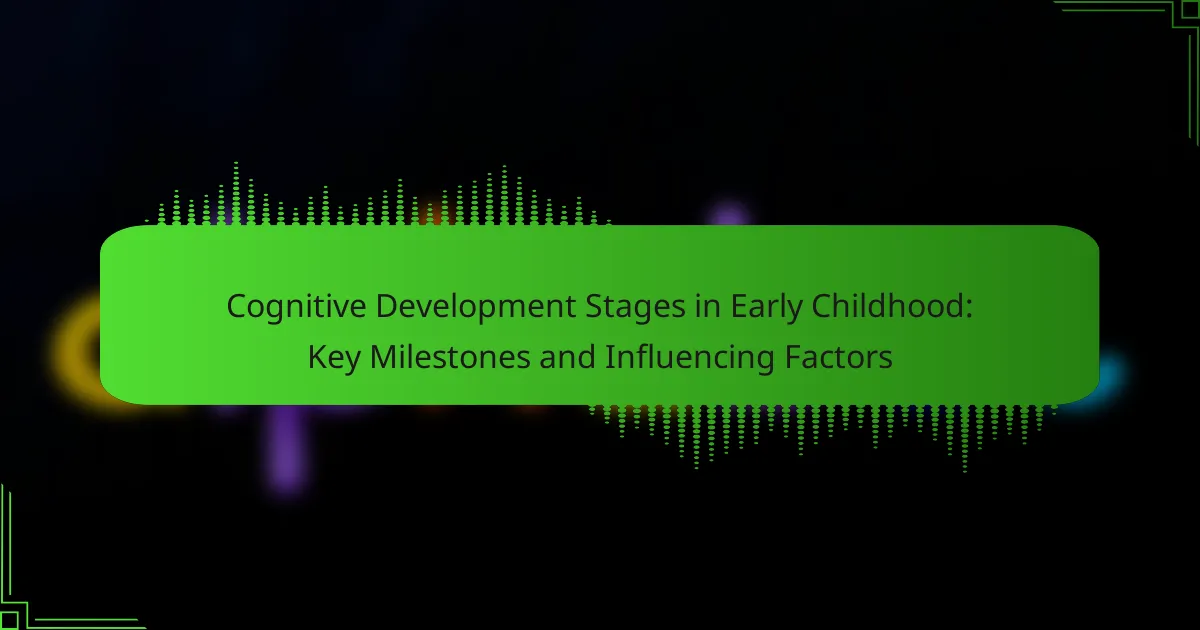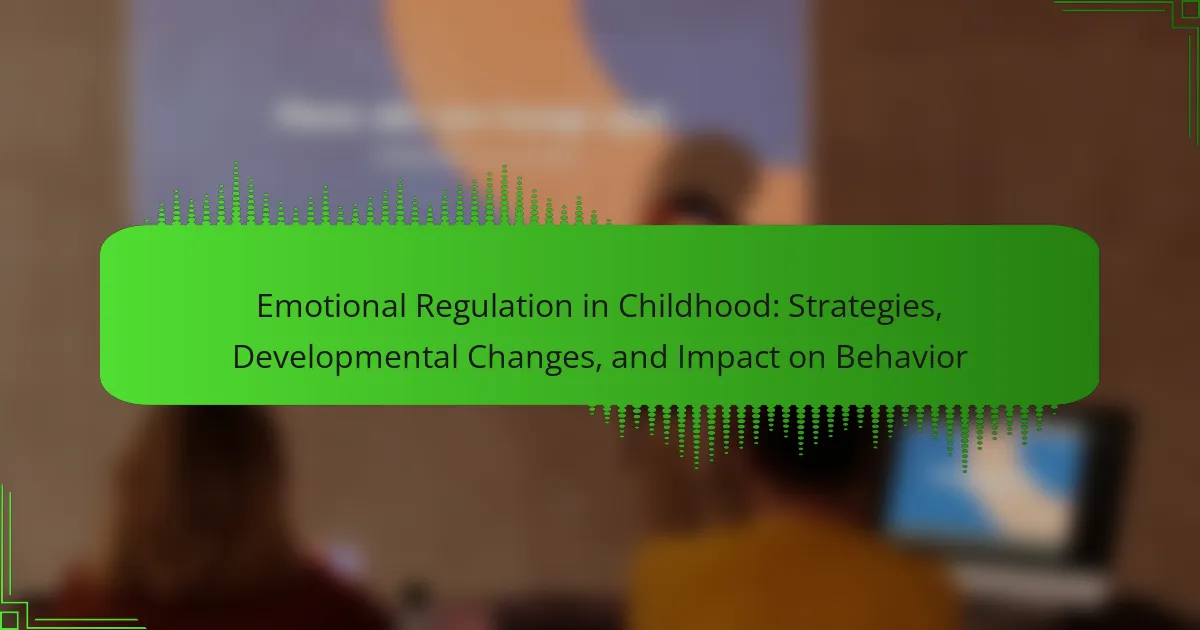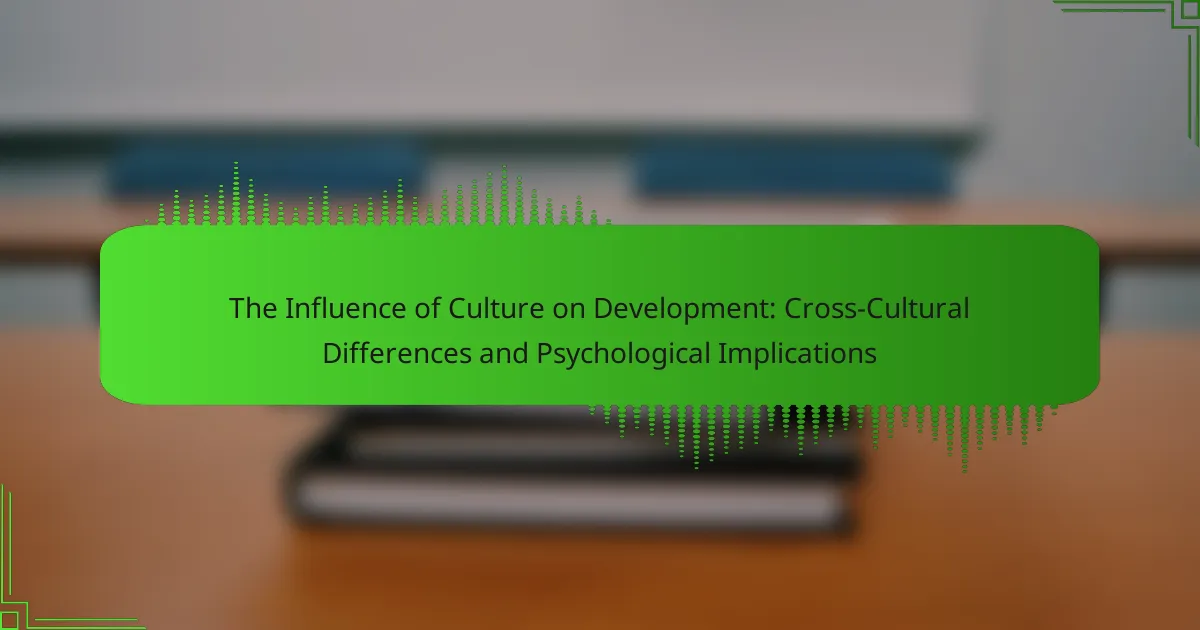Cognitive development stages in early childhood encompass four key phases: sensorimotor, preoperational, concrete operational, and formal operational. These stages, rooted in Jean Piaget’s theory, outline how children progress in their thinking abilities from birth through adolescence. Key milestones include the understanding of object permanence in infants, symbolic thinking in toddlers, logical reasoning in school-aged children, and abstract reasoning in adolescents. Influencing factors such as genetics, environmental conditions, and social interactions play a significant role in shaping cognitive growth, with research indicating that enriched environments lead to improved cognitive outcomes. This article provides a comprehensive overview of these stages and milestones, along with the critical factors that impact cognitive development in early childhood.
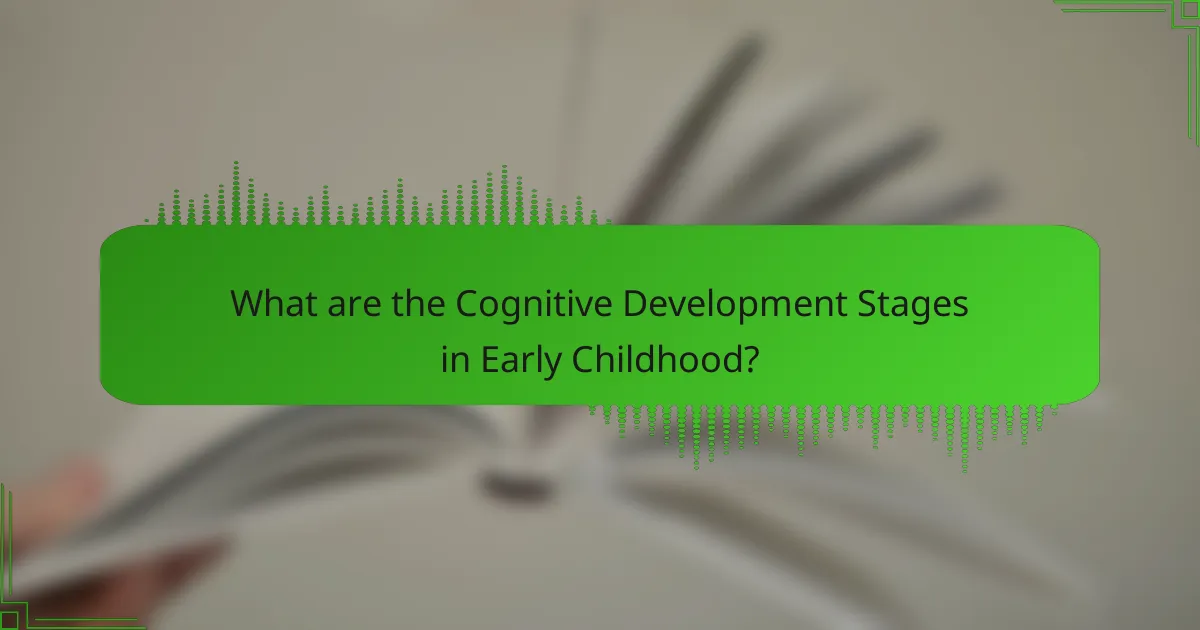
What are the Cognitive Development Stages in Early Childhood?
Cognitive development stages in early childhood include sensorimotor, preoperational, concrete operational, and formal operational stages. The sensorimotor stage occurs from birth to about 2 years. During this stage, infants learn through their senses and actions. The preoperational stage spans ages 2 to 7 years. Children in this stage begin to use language and engage in symbolic play. The concrete operational stage occurs from ages 7 to 11 years. Children start to think logically about concrete events. The formal operational stage begins at age 12 and continues into adulthood. In this stage, individuals develop abstract reasoning skills. These stages are based on Jean Piaget’s theory of cognitive development, which outlines how children progress through these stages as they grow.
How do these stages influence a child’s learning and behavior?
Cognitive development stages significantly influence a child’s learning and behavior. Each stage represents a unique way children understand and interact with the world. For example, during the sensorimotor stage, infants learn through sensory experiences and motor actions. This stage fosters problem-solving skills as children explore their environment. In the preoperational stage, children begin to use language and engage in symbolic play. This enhances their ability to communicate and express emotions. The concrete operational stage introduces logical thinking, allowing children to understand cause and effect. This stage influences their ability to follow rules and work collaboratively. Research indicates that children who progress through these stages effectively exhibit better academic performance and social skills. According to Piaget’s theory, these stages are universal, highlighting their fundamental role in shaping a child’s development.
What are the key characteristics of each cognitive development stage?
The key characteristics of each cognitive development stage are defined by Jean Piaget’s theory. The first stage is the Sensorimotor stage, occurring from birth to 2 years. Infants learn through sensory experiences and motor actions. Object permanence develops during this stage, indicating an understanding that objects exist even when unseen.
The second stage is the Preoperational stage, from ages 2 to 7. Children begin to use language and engage in symbolic play. Their thinking is egocentric, meaning they have difficulty understanding perspectives other than their own. They struggle with understanding the concept of conservation, which refers to the understanding that quantity remains the same despite changes in shape or appearance.
The third stage is the Concrete Operational stage, occurring from ages 7 to 11. Children start to think logically about concrete events. They gain a better understanding of the concept of conservation and can categorize objects based on multiple criteria. Their reasoning becomes more organized and structured.
The final stage is the Formal Operational stage, beginning at age 12 and continuing into adulthood. Individuals develop abstract reasoning and can think about hypothetical situations. They can formulate and test hypotheses, leading to more advanced problem-solving skills. These stages illustrate the progression of cognitive abilities from infancy through adolescence.
How do these characteristics manifest in everyday activities?
Cognitive development characteristics manifest in everyday activities through problem-solving, communication, and social interactions. Children demonstrate problem-solving by engaging in play that requires critical thinking, such as puzzles or building blocks. Communication skills develop as children express their needs and thoughts verbally during interactions. Social interactions reveal cognitive growth when children share toys or negotiate rules in games. These activities reflect their understanding of concepts like cause and effect, memory, and language use. Research shows that active engagement in these areas enhances cognitive milestones, supporting theories by Piaget and Vygotsky on learning through experience and social context.
Why is understanding cognitive development important for parents and educators?
Understanding cognitive development is crucial for parents and educators because it informs effective teaching and parenting strategies. Cognitive development encompasses the mental processes involved in gaining knowledge, such as thinking, reasoning, and problem-solving. By recognizing the stages of cognitive development, parents and educators can tailor their approaches to meet children’s developmental needs. For example, children aged 2-7 typically engage in symbolic thinking, which means they benefit from play-based learning. Research shows that children who receive appropriate cognitive stimulation during early years exhibit better academic performance later. Additionally, understanding cognitive milestones helps identify potential developmental delays, allowing for timely interventions. This proactive approach fosters a supportive learning environment that enhances children’s overall growth and learning outcomes.
How can knowledge of cognitive stages improve teaching strategies?
Understanding cognitive stages enhances teaching strategies by allowing educators to tailor their approaches to students’ developmental levels. Each cognitive stage, as defined by theorists like Piaget, represents distinct ways children think and learn. For example, during the preoperational stage, children benefit from visual aids and hands-on activities. This aligns with their tendency to think symbolically but not yet logically.
Additionally, knowledge of cognitive stages helps teachers set appropriate learning goals. It allows them to create lesson plans that match students’ abilities. Research shows that when teaching aligns with cognitive readiness, students engage more effectively.
Incorporating this understanding leads to improved educational outcomes. Studies indicate that differentiated instruction based on cognitive development results in higher retention rates and academic performance. Overall, applying knowledge of cognitive stages in teaching fosters a more supportive and effective learning environment.
What role do parents play in supporting cognitive development?
Parents play a crucial role in supporting cognitive development in children. They provide a stimulating environment that encourages exploration and learning. Parents engage in activities that promote problem-solving skills. They read to their children, enhancing language and comprehension abilities. Interactive play with parents fosters critical thinking and creativity. Research shows that parental involvement is linked to better academic performance. A study by the National Institute for Early Education Research found that children with involved parents score higher on cognitive assessments. Additionally, positive parent-child interactions contribute to social and emotional development, further supporting cognitive growth.
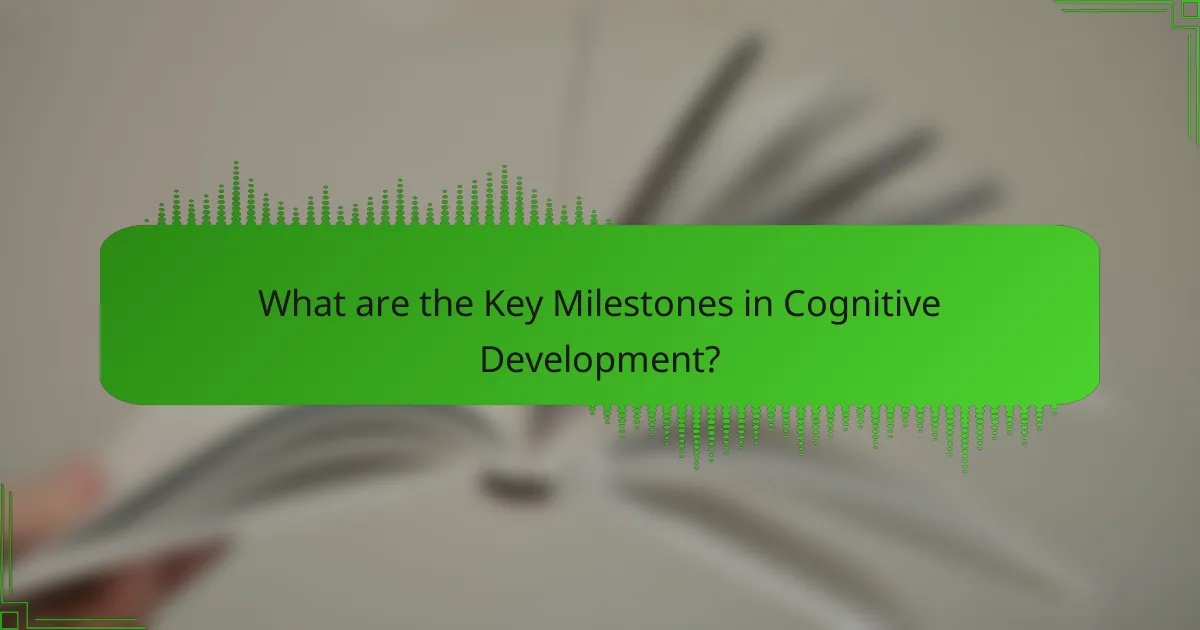
What are the Key Milestones in Cognitive Development?
Key milestones in cognitive development include several critical stages. Infants typically demonstrate object permanence around 8 to 12 months. This means they understand that objects continue to exist even when out of sight. By age 2, toddlers exhibit symbolic thinking, allowing them to use words and images to represent objects. Between ages 2 to 7, children enter the preoperational stage. They engage in imaginative play and begin to use language more effectively. Around age 7, children reach the concrete operational stage. They develop logical thinking about concrete events and understand the concept of conservation. Finally, from age 12 and onward, adolescents enter the formal operational stage. They can think abstractly and reason about hypothetical situations. These milestones are supported by developmental theories, such as Piaget’s stages of cognitive development.
What are the typical milestones for infants and toddlers?
Infants and toddlers reach various developmental milestones during their early years. Typical milestones include physical, cognitive, social, and language development.
By 1 month, infants can lift their heads while lying on their stomachs. At 3 months, they can follow moving objects with their eyes. By 6 months, they begin to sit without support. At 9 months, they can crawl and may pull themselves up to stand. By 12 months, many infants can walk independently.
Cognitive milestones include recognizing familiar faces by 3 months. By 6 months, they start to explore objects by putting them in their mouths. At 12 months, they can follow simple directions.
Social milestones begin with smiling socially by 2 months. By 6 months, they show interest in other children. By 12 months, they may exhibit separation anxiety.
Language milestones include cooing by 2 months. By 6 months, they can babble. At 12 months, many infants say their first words.
These milestones provide a framework for monitoring development in infants and toddlers.
How do sensory experiences contribute to cognitive milestones?
Sensory experiences significantly contribute to cognitive milestones by enhancing brain development and learning processes. Engaging with different senses helps children process information more effectively. For instance, tactile experiences can improve fine motor skills, which are crucial for writing and manipulation. Visual stimuli can aid in the development of spatial awareness and recognition skills. Auditory experiences promote language acquisition and comprehension abilities. Research indicates that sensory-rich environments lead to improved cognitive outcomes. A study by the National Institute of Child Health and Human Development found that early sensory experiences correlate with better academic performance later in life. Thus, sensory experiences are foundational for achieving cognitive milestones in early childhood.
What cognitive skills emerge during the preschool years?
During the preschool years, several cognitive skills emerge. These skills include problem-solving abilities, memory enhancement, and language development. Children begin to understand cause-and-effect relationships. They also develop the ability to categorize objects and concepts. Attention spans increase, allowing for better focus on tasks. Additionally, preschoolers start to engage in imaginative play, reflecting their growing understanding of the world. Research indicates that these skills are crucial for later academic success. For instance, studies show that early language skills correlate with later literacy and numeracy achievement.
What milestones are significant for early school-aged children?
Significant milestones for early school-aged children include improvements in cognitive, social, and emotional skills. Cognitive milestones involve enhanced problem-solving abilities and increased attention span. Children typically begin to read simple texts and perform basic math operations around this age. Social milestones include developing friendships and understanding social cues. Emotional milestones involve better self-regulation and the ability to express feelings appropriately. Research indicates that these milestones are crucial for academic success and overall development. According to the National Association for the Education of Young Children, achieving these milestones supports lifelong learning and well-being.
How do social interactions influence cognitive milestones at this age?
Social interactions significantly influence cognitive milestones during early childhood. These interactions promote language development, problem-solving skills, and social understanding. Engaging with peers enhances children’s ability to communicate effectively. Collaborative play encourages critical thinking and negotiation skills. Research shows that children who participate in group activities exhibit improved cognitive flexibility. Studies indicate that social interactions can lead to higher levels of creativity and emotional intelligence. For instance, Vygotsky’s theory emphasizes the role of social context in cognitive growth. This evidence supports the idea that social interactions are crucial for cognitive development at this age.
What role does language development play in cognitive milestones?
Language development is crucial for achieving cognitive milestones in early childhood. It facilitates the ability to think critically and solve problems. As children acquire language, they enhance their memory and comprehension skills. This development supports social interaction and emotional understanding. Research indicates that children with advanced language skills often perform better in tasks requiring reasoning and logic. For example, studies show a correlation between vocabulary size and cognitive abilities, highlighting the importance of language in intellectual growth. Language acts as a tool for children to express thoughts and engage in learning experiences.
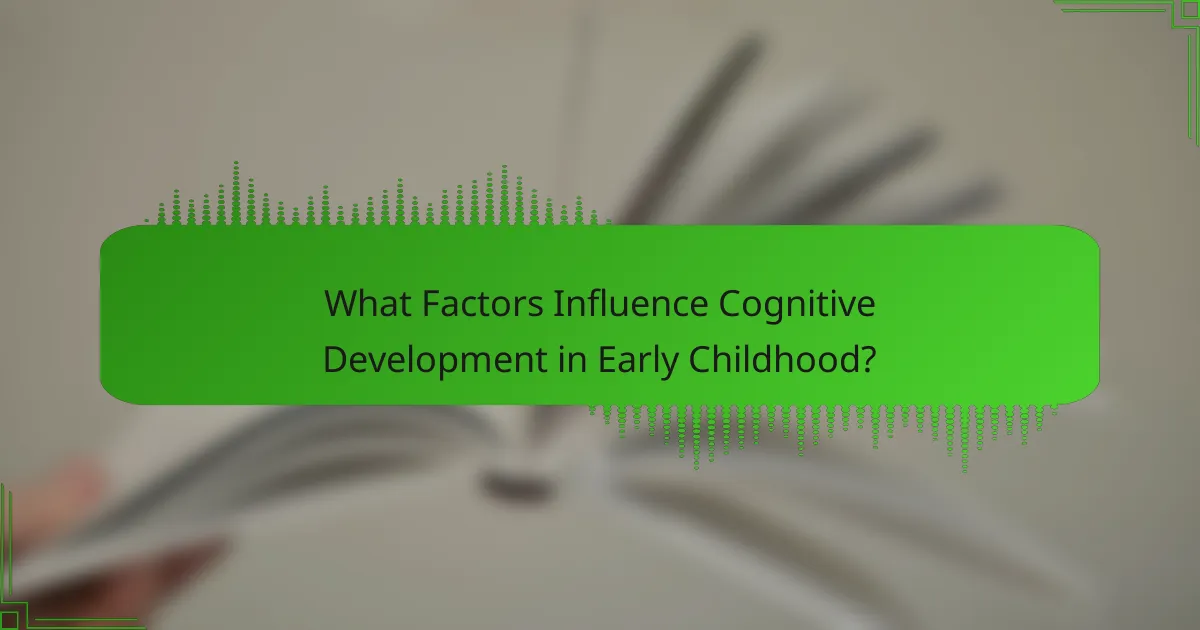
What Factors Influence Cognitive Development in Early Childhood?
Genetic factors, environmental influences, and social interactions significantly influence cognitive development in early childhood. Genetics provide the foundational brain structure and potential for cognitive abilities. Environmental factors, such as nutrition and exposure to stimulating experiences, shape cognitive growth. Quality of early education also plays a crucial role in developing cognitive skills. Social interactions with caregivers and peers enhance language skills and problem-solving abilities. Research indicates that children who engage in rich verbal interactions show improved cognitive outcomes. Studies have shown that children from enriched environments score higher on intelligence tests. These factors collectively contribute to the cognitive milestones achieved during early childhood.
How do environmental factors impact cognitive growth?
Environmental factors significantly impact cognitive growth. These factors include nutrition, socio-economic status, and exposure to stimulating environments. Proper nutrition supports brain development, as deficiencies can hinder cognitive abilities. Children from higher socio-economic backgrounds often have access to better educational resources. Such resources promote cognitive skills and critical thinking. Exposure to diverse experiences enhances problem-solving abilities and creativity. Research indicates that children in enriched environments score higher on cognitive tests. A study by the National Institute of Child Health and Human Development found that early learning experiences correlate with later academic success. Thus, environmental factors play a crucial role in shaping cognitive growth.
What is the significance of a stimulating environment?
A stimulating environment is crucial for cognitive development in early childhood. It enhances children’s learning and brain growth. Engaging experiences promote curiosity and exploration. Exposure to diverse stimuli aids in developing problem-solving skills. Research shows that children in stimulating environments perform better academically. A study by the National Institute of Child Health and Human Development found that early cognitive stimulation leads to higher IQ scores. This highlights the importance of providing rich, varied experiences during formative years.
How does socioeconomic status affect cognitive development?
Socioeconomic status significantly affects cognitive development in children. Higher socioeconomic status often correlates with better access to educational resources. Children from affluent families typically experience enriched learning environments. These environments include access to books, educational toys, and extracurricular activities. Conversely, children from lower socioeconomic backgrounds may face resource limitations. They often have reduced access to quality early childhood education. This lack of access can hinder cognitive skills such as language and problem-solving. Research indicates that children in low-income families score lower on cognitive assessments. A study by Duncan and Magnuson (2011) found that socioeconomic disparities contribute to achievement gaps. These gaps can persist throughout a child’s educational journey.
What role do genetics play in cognitive development?
Genetics play a significant role in cognitive development. They influence brain structure and function, affecting intelligence and learning abilities. Studies show that heritability estimates for cognitive abilities range from 40% to 80%. This indicates that genetics contribute substantially to individual differences in cognitive performance. Specific genes have been linked to cognitive traits, such as the COMT gene, which affects dopamine regulation in the brain. Environmental factors also interact with genetic predispositions, further shaping cognitive outcomes. Overall, genetics provide a foundational framework for cognitive development, while experiences and environment fine-tune these innate potentials.
How do hereditary factors interact with environmental influences?
Hereditary factors and environmental influences interact in complex ways to shape cognitive development. Genetic predispositions set certain potentials for cognitive abilities. However, environmental factors can enhance or inhibit these genetic potentials. For example, a child may inherit a genetic tendency for high intelligence. If raised in a stimulating environment, this potential can be fully realized. Conversely, a lack of educational resources may hinder cognitive growth despite genetic advantages. Research by Plomin and DeFries (1998) emphasizes that both genetics and environment contribute to cognitive outcomes. Their findings indicate that about 50% of the variance in intelligence is attributable to genetic factors, while environmental influences account for the remaining variance.
What are the implications of genetic predispositions on learning?
Genetic predispositions significantly influence learning abilities. They can affect cognitive functions such as memory, attention, and problem-solving. For example, certain genes are linked to higher IQ levels. Research shows that children with specific genetic markers may excel in language acquisition. Additionally, genetic factors can impact the development of learning disabilities. Studies indicate that heritability accounts for 40-70% of variance in academic achievement. Understanding these implications helps tailor educational approaches to individual needs.
What practical strategies can support cognitive development in early childhood?
Practical strategies to support cognitive development in early childhood include interactive play, reading, and problem-solving activities. Interactive play enhances social skills and critical thinking. Engaging children in conversations builds vocabulary and comprehension. Reading daily fosters language development and imagination. Providing puzzles and games promotes logical reasoning and spatial awareness. Encouraging exploration of the environment stimulates curiosity and learning. Routine and structure help children understand time and sequence. These strategies align with research showing that early stimulation positively influences cognitive growth.
How can parents create a conducive learning environment at home?
Parents can create a conducive learning environment at home by establishing a dedicated study space. This space should be quiet, well-lit, and free from distractions. Consistent routines help children know when to focus on learning activities. Providing access to educational resources, such as books and learning materials, supports cognitive development. Encouraging open communication fosters a positive atmosphere for asking questions and expressing thoughts. Setting achievable goals motivates children and builds confidence. Engaging in educational activities together enhances learning experiences. Research shows that a supportive home environment significantly impacts children’s cognitive development.
What activities promote cognitive skills in young children?
Activities that promote cognitive skills in young children include puzzles, memory games, and storytelling. Puzzles enhance problem-solving abilities and spatial awareness. Memory games improve attention and recall. Storytelling fosters language development and comprehension skills. Engaging in these activities stimulates neural connections. Research shows that interactive play significantly boosts cognitive development. According to a study by the National Institute for Early Education Research, children who participate in structured play demonstrate higher cognitive skills. These activities lay a foundation for lifelong learning.
Cognitive development stages in early childhood encompass the sensorimotor, preoperational, concrete operational, and formal operational stages, as outlined by Jean Piaget’s theory. Each stage is characterized by distinct cognitive abilities that influence learning and behavior, such as problem-solving, language development, and logical reasoning. Key milestones, environmental factors, and the role of genetics significantly impact cognitive growth during these formative years. Understanding these stages and their implications is essential for parents and educators to foster effective learning strategies and support children’s overall development.
